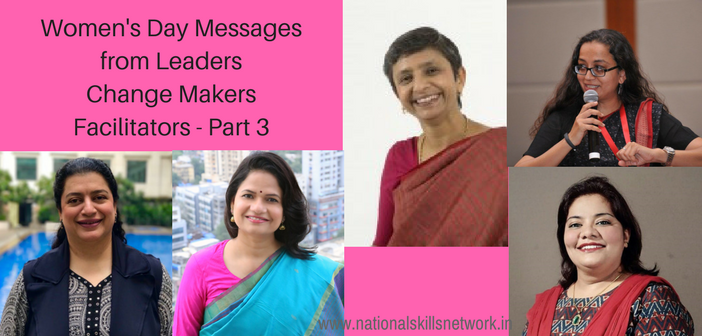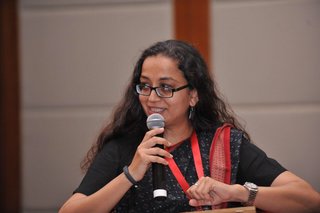On the occasion of International Women’s Day 2017, we present to you messages from key participants in the emerging skill development and vocational training ecosystem in India. Lead read on from Maneesha Chadha, Head – Philanthropic Initiatives, J.P. Morgan, India, Aradhana Lal, Vice President-Sustainability Initiatives, Lemon Tree Hotel Company, Prerana Langa, CEO, YES Foundation, Meena Raghunathan, Director, Community Services, GMR Varalakshmi Foundation, Dr Batool Fatima, Head – Community Connect, JUST.

Maneesha Chadha, Head – Philanthropic Initiatives, J.P. Morgan, India
 For those of us working in education or employability in India, the last few years have been an exciting period, with a number of new developments introduced by the government and private sectors. Skill-training programs are becoming demand-driven for employment opportunities that the country’s national priorities and economic growth are generating. Employability preparedness is integrating better with the education system through multi-skilling in schools and stronger counselling frameworks. With these early successes in hand, it is imperative that we continue to strive to make such emerging opportunities inclusive to all, irrespective of economic status, gender or physical capability.
For those of us working in education or employability in India, the last few years have been an exciting period, with a number of new developments introduced by the government and private sectors. Skill-training programs are becoming demand-driven for employment opportunities that the country’s national priorities and economic growth are generating. Employability preparedness is integrating better with the education system through multi-skilling in schools and stronger counselling frameworks. With these early successes in hand, it is imperative that we continue to strive to make such emerging opportunities inclusive to all, irrespective of economic status, gender or physical capability.
About 48% of India’s population is female but there has actually been a decline in female participation in the country’s labor force. It now stands a little over 25%. This low participation of women has been recognized by a number of employers who have introduced policies to retain and attract women employees. But what we are facing is not merely a challenge of the workplace – it emerges from the issues of female participation in education, social stigmas and restrictions that young women face. The links are evident.
Global statistics show that girls with secondary schooling are up to 6 times less likely to marry as children than those with little or no education. An extra year of secondary school for girls can increase their future earnings by 10-20%. The UNFPA estimates that if girls received the same secondary school opportunities as boys, the impact on India’s potential economic growth would be $33 billion and the IMF believes that India’s GDP will significantly increase if the number of women in the workforce increase to the level of men.
At J.P. Morgan our philanthropic efforts towards workforce readiness have shown us that career paths benefit from the building of talent pipelines that embed the dignity of labour in school, provide focused job-readiness skills in college and proactively engage with corporate employers through this process. With Lend A Hand India, we enable girls in class 9 and 10 to learn welding and plumbing while young boys of the same age learn how to cook and stitch; with TISS, young women pursuing a graduate degree can acquire technical training in graphic design and other vocations, on their college campus; and with Katalyst, we support young women from disadvantaged backgrounds, acquire critical job-readiness skills that will significantly improve their employer choices.
As education, employability and employment continue to align better with each other, we need to keep sight on inclusion and have a cohesive approach towards a more productive and participative labour market in India.












